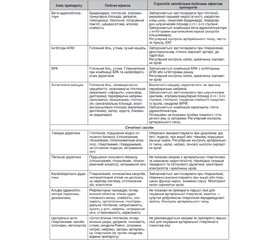Список литературы
1. Davies E.A., O’Mahony M.S. Adverse drug reactions in special populations — the elderly. Br. J. Clin. Pharmacol. 2015. 80(4). 796-807. doi: 10.1111/bcp.12596.
2. Ageing and life course. www.who.int/ageing/age_friendly_cities/en/index.html.
3. Aagaard L., Strandell J., Melskens L. et al. Global patterns of adverse drug reactions over a decade: analyses of spontaneous reports to VigiBase. Drug Saf. 2012. 35(12). 1171-1182. doi: 10.1007/BF03262002.
4. Dubrall D., Just K.S., Schmid M. et al. Adverse drug reactions in older adults: A retrospective comparative analysis of spontaneous reports to the German Federal Institute for Drugs and Medical Devices. BMC Pharmacol. Toxicol. 2020. 21. 25.
5. Alhawassi T.M., Krass I., Bajorek B. et al. A systematic review of the prevalence and risk factors for adverse drug reactions in the elderly in the acute care setting. Clin. Interv. Aging. 2014. 9. 2079-2086. doi: 10.2147/CIA.S71178.
6. Hofer-Dueckelmann C., Prinz E., Beindl W. et al. Adverse drug reactions (ADRs) associated with hospital admissions — Elderly female patients are at highest risk. Int. J. Clin. Pharmacol. Ther. 2011. 49. 577-586.
7. Monteiro C., Duarte A.P., Alves G. Adverse drug reactions in elderly: A five-year review of spontaneous reports to the Portuguese pharmacovigilance system. Expert Opin. Drug Saf. 2021. 20. 109-118.
8. Oscanoa T.J., Lizaraso F., Carvajal A. Hospital admissions due to adverse drug reactions in the elderly. A meta-analysis. Eur. J. Clin. Pharmacol. 2017. 73(6).759-770. doi: 10.1007/s00228-017-2225-3.
9. Gomes D., Maria Teresa Herdeiro M.T., Ribeiro-Vaz I. et al. Adverse Drug Reactions and Potentially Inappropriate Medication in Older Patients: Analysis of the Portuguese Pharmacovigilance Database. J. Clin. Med. 2022. 11. 2229. 2-11. https://doi.org/10.3390/jcm11082229.
10. Barber K.E., Hughes N., Lapane C. et al. Appropriate prescribing in elderly people: How well can it be measured and optimised? Lancet. 2007. 370. 173-184.
11. Hedna K., Hakkarainen K.M., Gyllensten H. et al. Potentially inappropriate prescribing and adverse drug reactions in the elderly: a population-based study. Eur. J. Clin. Pharmacol. 2015. 71. 12. doi: 10.1007/s00228-015-1950-8.
12. Beers M.H., Ouslander J.G., Rollingher I. et al. J.C. Explicit Criteria for Determining Inappropriate Medication Use in Nursing Home Residents. Arch. Intern. Med. 1991. 151. 1825-1832.
13. American Geriatrics Society 2015 Beers Criteria Expert Panel. American Geriatrics Society 2015 updated Beers criteria for potentially inappropriate medication use in older adults. J. Am. Geriatr. Soc. 2015. 63. 2227-2246.
14. Fick D.M., Semla T.P., Steinman M. et al. American Geriatrics Society 2019 Updated AGS Beers Criteria for Potentially Inappropriate Medication Use in Older Adults. J. Am. Geriatr. Soc. 2019. 67. 674-694. DOI: 10.1111/jgs.15767.
15. Gallagher P., Ryan C., Byrne S. et al. STOPРP (screening tool of older person’s prescriptions) and START (screening tool to alert doctors to right treatment). Consensus validation. Int. J. Clin. Pharmacol. Ther. 2008. 46(2). 72-83.
16. Rei T., Ramôa A., Pereira C. еt al. Prescrição potencialmente inapropriada em idosos numa unidade de saúde familiar do norte do país — aplicação dos critérios STOPРp/start versão 2. AIMGF Mag. 2018. 8. 16-21.
17. Laroche M.L., Charmes J.P., Merle L. Potentially inappropriate medications in the elderly: a French consensus panel list. Eur. J. Clin. Pharmacol. 2007. 63. 725-731.
18. Rognstad S., Brekke M., Fetveit A. et al. The Norwegian General Practice (NORGEP) criteria for assessing potentially inappropriate prescriptions to elderly patients. A modified Delphi study. Scand. J. Prim. Health Care. 2009. 27. 153-159.
19. Nyborg G., Straand J., Klovning A. et al. The Norwegian General Practice — Nursing Home criteria (NORGEP-NH) for potentially inappropriate medication use: a web-based Delphi study. Scand. J. Prim. Health Care. 2015. 33. 134-141.
20. Holt S., Schmiedl S., Thürmann P.A. Potentially inappropriate medications in the elderly: the PRISCUS list. Dtsch Arztebl. Int. 2010. 107. 543-551.
21. Renom-Guiteras A., Meyer G., Thürmann P.A. The EU(7)-PIM list: a list of potentially inappropriate medications for older people consented by experts from seven European countries. Eur. J. Clin. Pharmacol. 2015. 71. 861-875. DOI: 10.1007/s00228-015-1860-9.
22. Opondo D., Eslami S., Visscher S. et al. Inappropriateness of medication prescriptions to elderly patients in the primary care setting: a systematic review. PLoS One. 2012. 7. 8. doi: 10.1371/journal.pone.0043617.
23. Morin L., Fastbom J., Aroche M.L. et al. Potentially inappropriate drug use in older people: a nationwide comparison of different explicit criteria for population-based estimates. Br. J. Clin. Pharmacol. 2015. 80. 2-9. doi: 10.1111/bcp.12615.
24. Thorell K., Midlöv P., Fastbom J. et al. BMC Geriatrics. 2020. 20. 732. Р. 2-9. https://doi.org/10.1186/s12877-020-1476-5.
25. Chang C.B., Lai H.Y., Hwang S.J. et al. Prescription of potentially inappropriate medication to older patients presenting to the emergency department: a nationally representative population study. Sci Rep. 2018. 8(1). 1-8. doi: 10.1038/s41598-018-30184-4.
26. Weeda E.R., AlDoughaim M., Criddle S.. Association between potentially inappropriate medications and hospital encounters among older adults: a meta-analysis. Drugs Aging. 2020. 37. 7. doi: 10.1007/s40266-020-00770-1.
27. Plácido A.I., Aguiar A., Piñeiro-Lamas M. et al. Assessment of Potentially Inappropriate Medications Using the EU(7)-PIM List, in a Sample of Portuguese Older Adults’ Residents in Nursing Homes 1. Risk Management and Healthcare Policy. 2022. 15. 1343-1352.
28. Paulamäki J., Jyrkkä J., Hyttinen. V. et al. Prevalence of potentially inappropriate medication use in older population: comparison of the Finnish Meds75+ database with eight published criteria l. BMC Geriatrics. 2023. 23. 139. 2-11. https://doi.org/10.1186/s12877-022-03706-z.
29. Ена Л.M., Артеменко В.О., Купраш Е.В. Безопасность лекарств в гериатрии: концепция потенциально несоответствующих препаратов. Рациональная фармакотерапия. 2010. 2. 20-23.
30. Global Burden of Disease Risk Factor Collaborators. Global, regional, and national comparative risk assessment of 84 behavioural, environmental and occupational, and metabolic risks or clusters of risks for 195 countries and territories, 1990–2017: a systematic analysis for the Global Burden of Disease Study 2017. Lancet. 2018. 392. 1923-1994.
31. Uchmanowicz I., Chudiak A., Jankowska-Polańska B. et al. Hypertension and Frailty Syndrome in Old Age: Current Perspectives. Card. Fail. Rev. 2017. 3(2). 102-107. doi: 10.15420/cfr.2017:9:2.

